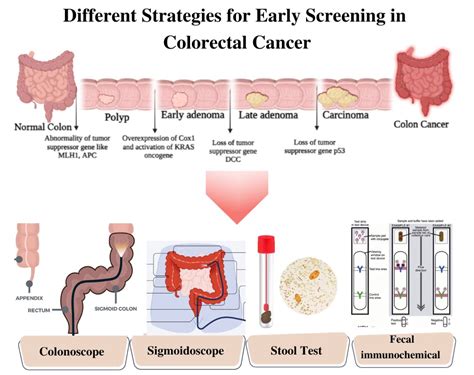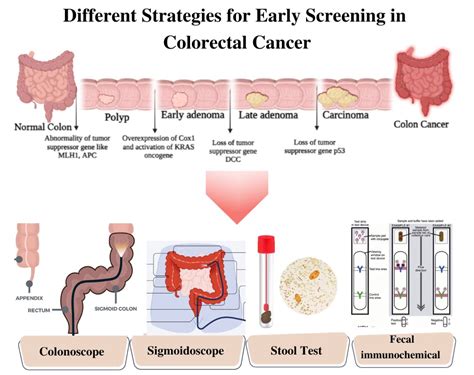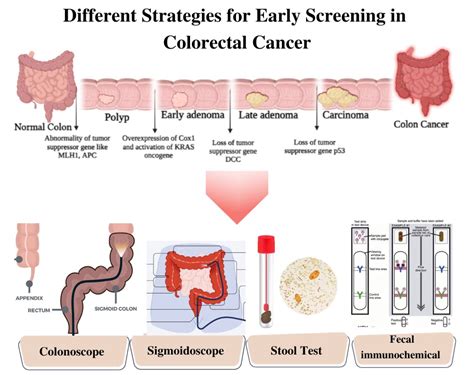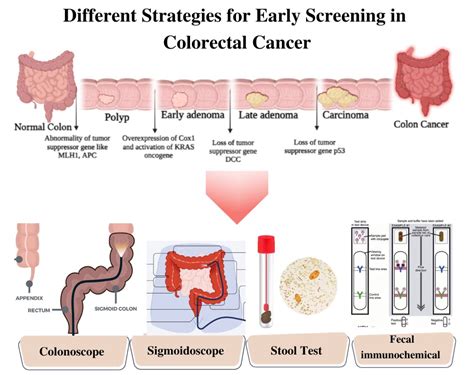Intro
Discover 5 ways to screen for colorectal cancer, including colonoscopy, sigmoidoscopy, and stool tests, to detect precancerous polyps and prevent colon cancer, promoting early detection and treatment for a healthier digestive system.
Colorectal cancer, also known as colon cancer, is a type of cancer that affects the large intestine. It is one of the most common types of cancer and can be fatal if left untreated. However, with early detection and treatment, the chances of survival increase significantly. Screening for colorectal cancer is essential to identify the disease in its early stages, and there are several methods to do so. In this article, we will discuss the importance of screening for colorectal cancer and explore five ways to screen for the disease.
The importance of screening for colorectal cancer cannot be overstated. According to the American Cancer Society, colorectal cancer is the third most common type of cancer in the United States, with over 100,000 new cases diagnosed each year. If caught early, the five-year survival rate for colorectal cancer is around 90%. However, if the disease is not detected until it has spread to other parts of the body, the survival rate drops to around 10%. Therefore, it is crucial to screen for colorectal cancer regularly, especially for individuals who are at high risk of developing the disease.
Regular screening can help identify colorectal cancer in its early stages, when it is most treatable. There are several risk factors that increase the likelihood of developing colorectal cancer, including age, family history, and lifestyle factors such as diet and exercise. Individuals who are 50 years or older, have a family history of colorectal cancer, or have a personal history of inflammatory bowel disease are at higher risk of developing the disease. By screening for colorectal cancer regularly, these individuals can reduce their risk of developing the disease and increase their chances of survival if they do develop it.
Introduction to Colorectal Cancer Screening

Benefits of Colorectal Cancer Screening
The benefits of colorectal cancer screening are numerous. Early detection and treatment can increase the chances of survival and reduce the risk of complications. Screening can also help identify precancerous polyps, which can be removed before they turn into cancer. Additionally, screening can help identify other health problems, such as inflammatory bowel disease, that may increase the risk of developing colorectal cancer.5 Ways to Screen for Colorectal Cancer

- Stool tests: These tests involve analyzing a sample of stool for blood or other abnormal cells. There are several types of stool tests, including guaiac-based tests and immunochemical tests.
- Flexible sigmoidoscopy: This test involves using a flexible tube with a camera and light on the end to examine the lower part of the colon.
- Colonoscopy: This test involves using a flexible tube with a camera and light on the end to examine the entire colon.
- CT colonography: This test involves using a CT scanner to take pictures of the colon.
- MRI: This test involves using a magnetic resonance imaging machine to take pictures of the colon.
Stool Tests for Colorectal Cancer Screening
Stool tests are a common method of screening for colorectal cancer. These tests involve analyzing a sample of stool for blood or other abnormal cells. There are several types of stool tests, including guaiac-based tests and immunochemical tests. Guaiac-based tests involve using a chemical called guaiac to detect blood in the stool, while immunochemical tests involve using antibodies to detect abnormal cells.How to Prepare for Colorectal Cancer Screening

What to Expect During Colorectal Cancer Screening
What to expect during colorectal cancer screening depends on the method used. For stool tests, individuals will typically be asked to provide a sample of stool, which will be analyzed in a laboratory. For flexible sigmoidoscopy and colonoscopy, individuals will typically be asked to lie on their side or back while the doctor inserts the tube into the rectum. For CT colonography and MRI, individuals will typically be asked to lie on a table while the machine takes pictures of the colon.Risks and Limitations of Colorectal Cancer Screening

Conclusion and Next Steps
In conclusion, screening for colorectal cancer is an essential step in detecting the disease early and increasing the chances of survival. There are several methods of screening, each with its own advantages and disadvantages. Individuals should talk to their doctor about their risk factors and medical history to determine which screening method is best for them. Additionally, individuals should follow any instructions provided by their doctor or the screening facility to ensure accurate results.We invite you to share your thoughts and experiences with colorectal cancer screening in the comments below. Have you or a loved one been screened for colorectal cancer? What was your experience like? Do you have any questions or concerns about colorectal cancer screening? Share your story and help raise awareness about the importance of screening for this disease.
What is the best way to screen for colorectal cancer?
+The best way to screen for colorectal cancer depends on the individual's risk factors and medical history. Talk to your doctor about the different screening methods and which one is best for you.
How often should I be screened for colorectal cancer?
+The frequency of screening for colorectal cancer depends on the individual's risk factors and medical history. Generally, individuals should be screened every 10 years starting at age 50.
What are the risks of colorectal cancer screening?
+While colorectal cancer screening is an effective way to detect the disease, there are some risks to consider, such as discomfort, bleeding, and radiation exposure.
Can colorectal cancer be prevented?
+While there is no sure way to prevent colorectal cancer, there are some steps that can be taken to reduce the risk, such as maintaining a healthy diet, exercising regularly, and not smoking.
What are the symptoms of colorectal cancer?
+The symptoms of colorectal cancer may include blood in the stool, abdominal pain, and changes in bowel habits. If you experience any of these symptoms, talk to your doctor.
